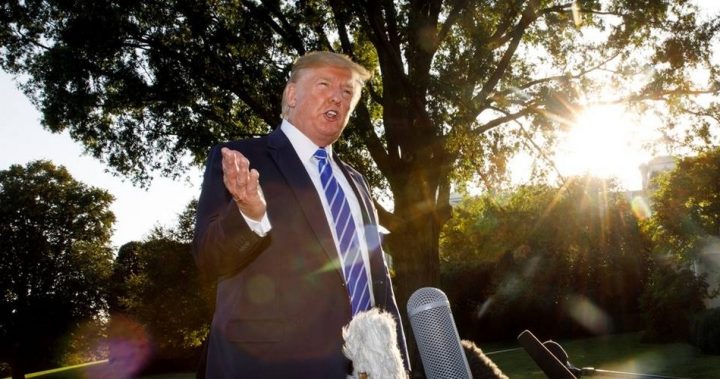
Following a mass shooting in west Texas that left seven people dead, President Donald Trump told reporters Sunday that he has conferred with members of Congress, noting that “people want to do something,” adding that his administration is “looking at a lot of different things” as part of a legislative package to suggest to Congress.
On Saturday, a man pulled over for a traffic violation opened fire on Texas state troopers before fleeing the scene. The man then shot a total of 20 people before he was finally killed by police. Authorities have not yet released a motive as to why the man reacted the way he did to simply being pulled over.
The “something” that Trump appears to be favoring is “strong measures to keep weapons out of the hands of dangerous and deranged individuals,” coupled with improvements to a mental-health system that Trump claims is “broken.” Additionally, Trump wants to ensure that criminals with guns “are put behind bars and kept off the streets.”
Despite the urge to “do something,” Trump admitted that it was unlikely that any new laws could “eliminate” mass shootings, although that is something “wonderful to say.”
“For the most part, sadly, if you look at the last four or five [mass shootings] going back even five or six or seven years, for the most part, as strong as you make your background checks, they would not have stopped any of it,” Trump said in explaining why he is not calling for a stricter background check law. “So it’s a big problem. It’s a mental problem. It’s a big problem.”
Trump said that while, “Public safety is our No. 1 priority,” he “always [wants] to protect our Second Amendment,” adding that the Second Amendment, designed to protect the right of individual American citizens to keep and bear arms is “so important.”
While Trump has rhetorically defended the right of individual Americans to keep and bear arms, and is now opposing tougher background checks, back in August after another shooting in Texas, in El Paso, and another shooting in Dayton, Ohio, he wavered, arguing that it was time to enact laws creating “very meaningful background checks,” noting that there was “tremendous support” for such laws. He even took issue with the National Rifle Association’s position that more background-check legislation would only open the door to infringing upon the gun-ownership rights protected by the Second Amendment.
Trump’s vacillation on the issue has certainly emboldened gun-ownership opponents and led to compromising by those who in the past have claimed to support the Second Amendment. House Speaker Nancy Pelosi (D-Calif.) said it was time for the Republican-majority Senate to “end its obstruction” and send Trump some gun-control measures that the Democrat-majority House of Representatives has passed. Senator Pat Toomey (R-Pa.) has lobbied Trump to further curb gun rights, and told ABC’s This Week that Trump is “very interested in doing something meaningful.” Toomey has teamed with Democratic Senator Joe Manchin of West Virginia, who has fought off strong Republican reelection challenges by promising to stand up for the Second Amendment, to expand background checks. Toomey also said that he favors keeping guns away from people who should not have them.
“We’re going to take a very serious run at it,” Toomey said.
Appearing on NBC’s Meet the Press, Senator Rick Scott (R-Fla.) even boasted that his state of Florida, while he was governor, provided a model for the nation with its “red flag” law, passed in the aftermath of the Parkland school shooting. Florida’s law allows government authorities to confiscate firearms (and other weapons) from individuals whom the courts determine to be a threat to others, or even themselves.
Scott said he had no desire to take a gun away from a law-abiding citizen, but “we’ve got to figure out how we get guns away from mentally ill people who want to harm others or themselves.” While Scott claims he does not want to take a gun away from a law-abiding citizen, the facts are that such red flag laws have already done that, and will no doubt continue to do so in the future.
It should be noted that, as background checks have not stopped mass shootings, it is almost certain that so-called red flag laws, at the state and federal level, will not eliminate mass shootings. Laws against murder, robbery, and rape do not even stop all murder, robbery, and rape. Likewise, laws against drugs have done essentially nothing to stop the use, sale, and proliferation of drugs. And, because there will continue to be mass shootings, even with red flag laws, enemies of the Second Amendment will predictably agitate for even more laws to stop mass shootings.
At some point, the clamor to “do something” will lead to a demand for outright confiscation of all firearms from all private citizens — regardless of the Second Amendment. At that point, will we be able to count on the president and Congress to defend the Second Amendment rights of Americans, or will they simply buckle to the demand to “do something?”
Photo: AP Images
Steve Byas is a university history and government instructor, and is the author of three books, including History’s Greatest Libels. He may be contacted at [email protected]



